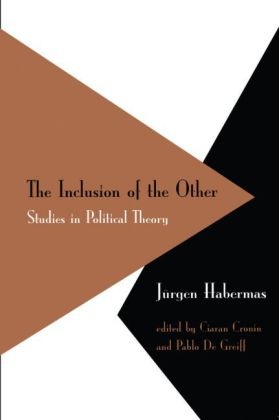Read more
The Inclusion of the Other contains Habermas s most recent work inpolitical theory and political philosophy. Here Habermas picks upsome of the central themes of Between Facts and Norms andelaborates them in relation to current political debates.
One of the distinctive features of Habermas s work has been itsapproach to the problem of political legitimacy through a sustainedreflection on the dual legitimating and regulating function ofmodern legal systems. Extending his discourse theory of normativevalidity to the legal-political domain, Habermas has defended aproceduralist conception of deliberative democracy in which theburden of legitimating state power is borne by informal and legallyinstitutionalized processes of political deliberation. Its guidingintuition is the radical democratic idea that there is an internalrelation between the rule of law and popular sovereignty. In theseessays he brings this discursive and proceduralist analysis ofpolitical legitimacy to bear on such urgent contemporary issues asthe enduring legacy of the welfare state, the future of the nationstate, and the prospects of a global politics of human rights.
This book will be essential reading for students and academics insociology and social theory, politics and political theory,philosophy and the social sciences generally.
List of contents
Editor s Introduction.
Translator s Note. Preface.
Part I: How Rational is the Authority of the Ought?: .
1. A Genealogical Analysis of the Cognitive Content ofMorality.
Part II: Political Liberalism: A Debate with John Rawls: .
2. Reconciliation through the Public Use of Reason.
3."Reasonable" versus "True," or the Morality of Worldviews.
Part III: Is There a Future for the Nation-State? .
4. The European Nation-State: On the Past and Future ofSovereignty and Citizenship.
5. On the Relation between the Nation, The Rule of Law, andDemocracy.
6. Does Europe Need a Constitution?Response to Dieter Grimm.
Part IV: Human Rights: Global and Internal.
7. Kant s Idea of Perpetual Peace: At Two Hundred Years Historical Remove.
8. Struggles for Recognition in the Democratic ConstitutionalState.
Part V: What Is Meant by "Deliberative Politics"?: .
9. Three Normative Models of Democracy.
10. On the Internal Relation between the Rule of Law andDemocracy.
Notes.
Index.
About the author
Jürgen Habermas, 1929 in Düsseldorf geboren, Philosoph und Soziologe, studierte Philosophie, Geschichte und Psychologie in Göttingen, Zürich und Bonn, wo er 1954 promovierte. Von 1956 bis 1959 war er Assistent am Institut für Sozialforschung in Frankfurt am Main und nahm dort wesentliche Impulse der Frankfurter Schule auf. Aus ihrer Tradition hat er die seine weiteren Arbeiten strukturierende Fragestellung entwickelt, wie eine kritische Theorie der Gesellschaft beschaffen zu sein habe, die eine dem erreichten Stand sozialwissenschaftlicher Erkenntnis wie historischer Erfahrung angemessene Theorie der Demokratie darstelle. 1961 habilitierte er in Marburg und wurde auf ein Extraordinariat für Sozialphilosophie nach Heidelberg berufen. 1964 erhielt er eine Professur für Philosophie und Soziologie in Frankfurt am Main. 1971 wurde er, gemeinsam mit Carl-Friedrich von Weizsäcker, Direktor des "Max-Planck-Instituts zur Erforschung der Lebensbedingungen der wissenschaftlich-technischen Welt" in Starnberg. 1982 folgte Habermas dem Ruf nach Frankfurt am Main auf eine Professur für Soziologie und Philosophie. Jürgen Habermas erhielt zahlreiche Ehrendoktorwürden und Preise, darunter den "Friedenspreis des Deutschen Buchhandels" (2001), den "Kyoto-Preis" (2004) und den "Heine-Preis" (2012) "... für sein Lebenswerk, das durch freiheitliche Ideen der Aufklärung, seinen unermüdlichen Einsatz für ein demokratisch verfasstes Deutschland sowie seine streitbaren Beiträge zu den gesellschaftspolitischen Debatten Europas geprägt ist", so die Begründung der Jury. 2013 wurde Jürgen Habermas mit dem "Kulturellen Ehrenpreis" der Landeshauptstadt München ausgezeichnet. Außerdem wurde Jürgen Habermas mit dem Erasmus-Preis 2013 ausgezeichnet.
Summary
The Inclusion of the Other contains Habermasa s most recent work in political theory and political philosophy. Here Habermas picks up some of the central themes of Between Facts and Norms and elaborates them in relation to current political debates.
Report
Jürgen Habermas has been awarded the prestigious Friedenspreis des deutschen Buchhandels prize for 2001

